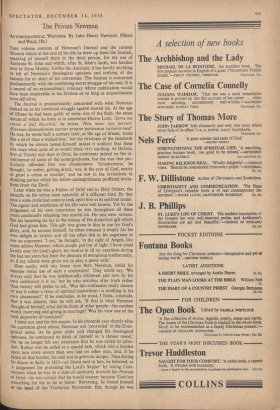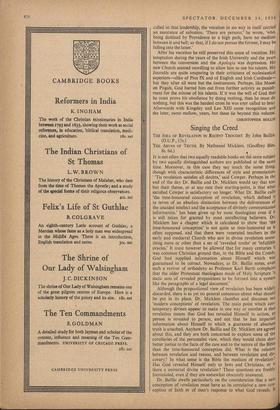The Private Newman
THIS volume consists of Newman's Journal and the curious Memoir which at the end of his life he drew up from the Journal, speaking of himself there in the third person, for the use of Ambrose St. John and which, after St. John's death, was handed over to Anne Mozley. Unlike the Apologia, it has hardly anything to tell of Newman's theological opinions and nothing of the reasons for or story of his conversion. The Journal is concerned predominantly with the continuing secret struggle of his soul. It is a record of an extraordinary intimacy whose publication would have been intolerable in his lifetime or so long as acquaintances were still alive.
The Journal is predominantly concerned with what Newman looked on as his continual struggle against mortal sin. At the age of fifteen he had been guilty of some sins of the flesh, the exact nature of which he hints at in somewhat elusive Latin. 'Serva me carnis a [sic] illecebris,' he writes. 'Neu, miser ego, peccavi. "Eternam damnationem mereor propter portentosa facinora mea!' He was, he wrote half a century later, at the age of fifteen, 'more like a devil than a wicked boy,' but the strictness of the standards by which he always tested himself makes it unlikely that these sins were what most of us would think very startling. At Oxford, first at Trinity and then at Oriel, he comments indeed on the in- continence of some of the undergraduates, but the vice that par- ticularly offended him was drunkenness. 'Drunkenness,' he thought, 'or rather, getting drunk, was, in the eyes of God, nearly as great a crime as murder,' and he saw in the invitations to drinking parties which his fellow-undergraduates proffered invita- tions from the Devil.
Later when he was a Fellow of Oriel and in Holy Orders, the assaults on his virtue were naturally of a different kind. By that time a wide circle had come to look upon him as its spiritual leader. The rigour and asceticism of his life were well known. Yet by the Judgement of his own conscience he was throughout all these Years continually relapsing into mortal sin. His sins were various. But his besetting sin lay in the misuse of the dialectical gift which God had given him. This gift was given to him to use for God's glory, and, he accuses himself, he often misused it simply for his own delight in victory and all too often lied in his eagerness to win an argument. 'I am,' he thought, 'in the sight of Angels, like some odious Monster, which people put out of sight. I have acted hardly ever for God's glory, my motive in all my exertions during the last ten years has been the pleasure of energising intellectually, as if my talents were given me to play a game with.'
How easily, with any lesser man than Newman, could his enemies make use of such a confession ! They could say, 'We always said that he was intellectually dishonest and now by his own confession it is so,' but he who searches after truth rather than victory will prefer to ask, Was this confession really sincere or was it rather a form of spiritual masochism—a revelling in his own abasement?' If he concludes, as he must, I think, conclude, that it was sincere, then he will ask, 'If that is what Newman thought of himself, what did he think of other people—the careless World, marrying and giving in marriage? Was his view one of the total depravity of mankind?'
I think not, and for this reason. In his sixteenth year shortly after the quotation given above, Newman was 'converted' in the Evan- gelical sense. As he grew older and changed his theological opinions, he continued to think of himself as 'a chosen vessel,' but he no longer felt any assurance that he was called to salva- tion. Rather was he called to a special task, which laid a burden upon him more severe than was laid on other men, and, if he failed of that burden, his soul was in grievous danger. Thus during his illness in Sicily in 1833—an illness sent to him, he believed, as a judgement for profaning the Lord's Supper' by taking Com- munion when he was in a state of uncharity towards the Provost of Oriel—he was certain that he would recover because 'God has something for me to do at home.' Returning, he found himself at the bead of the Tractarian Movement. But, though he was
called to that leadership, the vocation in no way in itself carried an assurance of salvation. 'There arc persons,' he wrote, 'who, being destined by Providence to a high path, have no medium between it and hell; so that, if 1 do not pursue the former, I may be falling into the latter.'
After his vocation he still preserved this sense of vocation. His temptation during the years of the Irish University and the years between the conversion and the Apologia was depression. His new Church seemed unwilling to allow him to use his talents. His Journals are quite unsparing in their criticisms of ecclesiastical superiors—alike of Pius IX and of English and Irish Cardinals-- but they after all were but the instruments. Perhaps, like Moses on Pisgah, God barred him out from further activity as punish- ment for the misuse of his talents. If it was the will of God that he must prove his obedience by doing nothing, then he must do nothing, but this was the hardest cross he was ever called to bear. Afterwards with Kingsley and Leo XIII came recognition and the later, more mellow, years, but these lie beyond this volume.
CHRISTOPHER HOLLIS











































 Previous page
Previous page